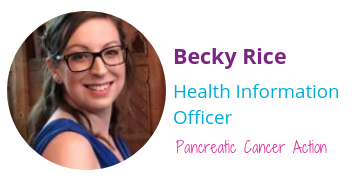Early Diagnosis Research Conference
Our Health Information Officer, Becky Rice, attended the Early Diagnosis Research Conference. Here is what you need to know!
The Cancer Research UK early diagnosis conference took place in Birmingham from 11th to 13th of February. The conference was attended by researchers, medical professionals, charities and patient representatives all with a focus on achieving early diagnosis across all cancers.
The new NHS long term plan includes a goal to increase early (stage one and two) diagnosis of cancer to 75% of patients within the next ten years. Therefore, much of the focus of this conference was on how far current plans go to meet this goal and what will need to be done in addition.
Plans for multidisciplinary diagnostic centres (MDCs’)
Presentations were given by a variety of speakers about research targeting different areas of early diagnosis. For pancreatic cancer, there were some particularly interesting speakers discussing the government’s plans for multidisciplinary diagnostic centres (MDCs’) across the country. Pilot projects were evaluated for the centres, which aim to diagnose cancer in people with vague but serious symptoms (such as fatigue, nausea and abdominal pain) faster.
Patients are referred by their GP to the centres for tests such as CT or ultrasound and in some cases, results can be read on the same day. This benefits patients who have a suspicion of cancer as they can be referred to the correct speciality with test results completed faster. It also helps those who do not have cancer to get the right diagnosis and be reassured, saving a long period of worrying.
Our thoughts…
MDC’s had an important impact on pancreatic cancer, which in some cases was the most common cancer diagnosed. Patients and GPs found the centres improved their experience of the health care service, and pancreatic cancer was found earlier than it may have been. However, most cases were still diagnosed late stage three and four) and therefore beyond the point that patients can have surgery and a chance of a cure.
Further, it was pointed out that without access to scanners and staff to read the images produced, it is not possible to run a diagnostic centre service. Hospitals with newer scanners and equipment may be able to run the service better then ones that do not, which could lead to inequalities in diagnosis and a ‘postcode lottery’.
Telephone consultations
Alexander Thomson, a physician’s associate working to reduce time to diagnosis of upper GI cancers like pancreatic, gave an interesting presentation. His research focused on conducting a telephone consultation with patients suspected of having cancer. Diagnostic tests (such as CT scans) were booked as a result of this and patients could have their questions answered and scans completed before seeing a specialist. Patients who had a telephone consultation were diagnosed and had treatment decisions made faster than under the previous system.
Pancreatic Cancer Research
Research involving Pancreatic Cancer Action was represented with a poster by Mieke Van Hemelrjick and her team in Sweden. They investigated the role of different antibodies (the bodies disease fighting component) and bacteria in pancreatic cancer. The study suggests that people with high levels of IgG antibody (the most commonly made one in the body) may have a reduced chance of pancreatic cancer. The researches followed participants for over twenty years, comparing antibody levels and who was diagnosed with pancreatic cancer during this time. The study could be a starting point for a greater understanding of pancreatic cancer.
Wrapping up
As the conference demonstrates, a huge amount of work is going into diagnosing cancer earlier. From big ideas around the way that the health service is organised to the details of understanding exactly what happens in the body when cancer occurs. Research and ideas are being made a reality across the NHS. However, there is still a long way to go to meet the NHS target of 75% early diagnosis, especially in pancreatic cancer and questions remain about how this can be done.
